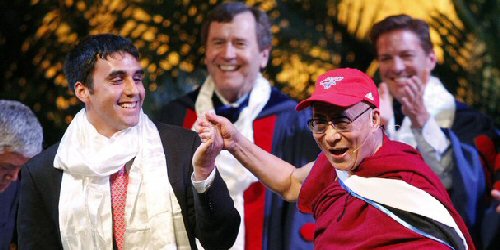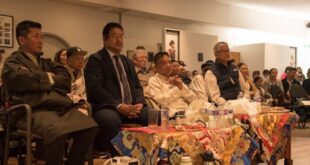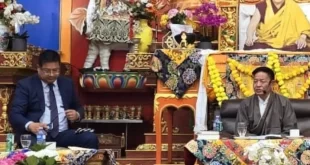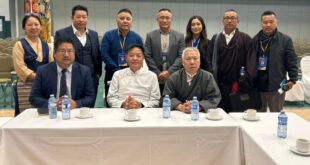His Holiness the Dalai Lama left Minneapolis on May 9, 2011 for his next leg of his program in Dallas, Texas, receiving an honorary degree from the Southern Methodist University and giving a talk on democracy. On his arrival at his Dallas hotel, he was welcomed by former Special Coordinator for Tibetan Issues Paula Dobriansky, Ms. Elsie Walker, cousin of President George W. Bush, and Ms. Mary Beth Markey, President of the International Campaign for Tibet.
Arriving at the Southern Methodist University in the afternoon, he was greeted by University President Gerald Turner, Provost Paul Ludden, and other officials. His Holiness first made a brief remark to around 200 students who were participants of the Hart Global Leaders Forum. These students had come from 45 schools around Dallas. His Holiness told them that it was important to realize that at the fundamental level we were all the same human beings and that everything else was secondary. His Holiness then briefly met with former first lady Laura Bush, who is a regent of SMU and also attended his public talk subsequently.
The program began with remarks by Mrs. Linda W. Hart, who along with her husband had established the Hart Global Leadership Forum. She said that every year she and her husband looked for those speakers who would make an impact on the students and by having His Holiness the Dalai Lama, she said they may have “reached the pinnacle of search for global leaders.”
University President Turner, in his remarks, spoke about His Holiness’ message of peace, nonviolence and universal responsibility, and compassion. He said His Holiness became the first Nobel laureate recognized for his concern for global environmental problems. He called His Holiness an inspiration for generations of people worldwide and highlighted His Holiness’ three commitments of promotion of human values, promotion of religious harmony, and finding a solution to the Tibetan problem.
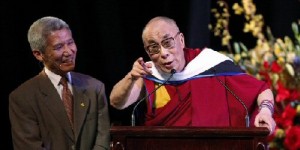
Thereafter President Turner and Provost Ludden conferred an honorary degree on His Holiness. In his remarks, Provost Ludden said, “Honorary degrees define the values of the university. We are charged with responsibilities of identifying individuals from all corners of the globe who, through a lifetime of sustained accomplishment and service, represent the highest values of this university. Today we honor His Holiness 14th Dalai Lama Tenzin Gyatso, spiritual leader of Tibet. More importantly he honors us. What we do in honoring this extraordinary individual is to define through him our institution and personal ideals that reflect discipline, creativity, tolerance, compassion and leadership.” He said the honorary degree was for His Holiness’ life long leadership in promoting peace, compassion and inter-religious understanding. The citation read, “Southern Methodist University, To all Whom these presents shall come, Greeting: Be it known that His Holiness the 14th Dalai Lama, Tenzin Gyatso, having honorably fulfilled all the requirements imposed by the authorities of this Institution, the President and the Trustees of Southern Methodist University, upon recommendation of the Faculty, do therefore confer the degree of Doctor of Humane Letters, honoris causa, with all the Honors, Rights, and Privileges to that degree appertaining. Given on this ninth day of May in the centennial year of the University’s founding, two thousand and eleven.”
His Holiness began his talk by thanking the university for the degree specially because it came with genuine warm feelings. He said that to an individual passing through a difficult period with heavy responsibility, this kind of encouragement was very helpful. His Holiness acknowledged the presence of Mrs. Laura Bush in the audience.
His Holiness said that all human beings were the same and that difference in faith, race, language, culture, etc., was secondary. He said when we came from our mother’s womb there was no difference of religion, race, etc.
He said as a child he could sense that there were lot of drawbacks and injustice in the governance system that prevailed in Tibet. After assuming temporal responsibility he had initiative reforms, including the setting up of a Reforms Committee. However, he said the Chinese authorities made it impossible to carry out these reforms because the Chinese wanted to carry reform according to their own way. Once he came into India in exile in 1959, His Holiness took advantage of the freedom there to implement reforms, including instituting a system of elected political leadership.
His Holiness said ideologically the world belongs to humanity and not to kings or spiritual leaders, Similarly, the United States belong to the 300 million American people and not to any one political party. However, since all the American people cannot govern the system of electing representatives to govern had been instituted with government for the people and by the people.
His Holiness talked about the electoral reforms that he had undertaken in the Tibetan community. He said while preaching to others about the value of separating religion and politics, His Holiness said he found it a bit hypocritical for him to hold dual spiritual and temporal leadership. Therefore, he had taken steps to devolve authority to elected Tibetan leadership saying, “I am totally dedicate to democracy.”
His Holiness lauded the United States as a champion of democracy, freedom and liberty. He urged people not to be discouraged by some economic problems and that people should keep to their principles and values.
He said in order for democracy to be meaningful, the leadership should be honest, transparent and have a sense of responsibility, not merely during election time.
He said while the United States may enjoy democracy there are many other regions in the world where there was no democracy. In this context, His Holiness praised the effort made by former president George W. Bush throughout the world saying that his motivations were good for democracy. His Holiness said he was not suggesting American dominance but for promoting democracy, religious freedom, etc. Here, His Holiness expressed his gratitude to the United States Government and Congress for supporting our just struggle.
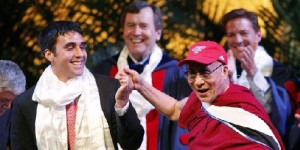
Addressing the students His Holiness said that it was up to their generation whether or not to turn the 21st century to a happy, peaceful and compassionate one. He said they had a special moral responsibility and role. He suggested that the students needed to have a holistic education so that they can reduce the gap between appearance and reality. He said they should also generate positive inner values saying that compassion, forgiveness, etc., are not a religious matter. He said everyone needed to be warm hearted and promote secular ethics. Here explained about secularism the way it is understood in India where the word is completely neutral.
His Holiness concluded by asking the people to be optimistic and never be demoralized or pessimistic.
Following his talks, His Holiness answered some questions directly from the audience. The questioners were mainly from students and the questions ranged from how he came to be the Dalai Lama to what was his favorite place in the world (he said there was not just one place and recited a Tibetan saying that anyone giving affection is a parent and any place that brings happiness is a home) to what did he see for the future of Tibet. His Holiness reiterated his position for a solution to Tibet without separation from the People’s Republic of China. Tibet was materially backward and Tibetans wanted modernization, but at the same time Tibetans had separate language and a rich culture and even the Chinese Constitution provided for autonomy for nationalities, he said. He added that changes were taking place throughout the world and in China. He called that when he visited China in 1954-55 many Chinese were vying to study Russian with very few studying English. Today, he said there were many Chinese studying English and hardly any studying Russian.
His Holiness said he was optimistic and talked about new awareness among Chinese on Tibet. He said in the past two years there were over 1000 articles in Chinese by Chinese on Tibet that supported His Holiness’ approach and were critical of the Chinese Government.
When asked how he could reconcile the promotion of democracy with the idea of cultural imperialism, His Holiness said that democracy is universal and not an American possession. He said if countries had strong culture then there was no danger of cultural imperialism. He said the danger is there when a culture is weakened and a vacuum is created as in the case of China after the Cultural Revolution.
His Holiness talked about democratic practices prevalent in Buddhist communities as well as in India, Japan and Taiwan to support the fact that democracy was universal.
The SMU Daily Campus newspaper quoted a reaction to the talk from the former Student Body President Jake Torres who said, “I have been incredibly blessed to meet one of the true spiritual leaders of the world.”
Over 2,500 people attended the talk. The University had announced that due to overwhelming demand, tickets for the general public were sold out.
According to the University, “Since its inception in 1999, the Hart Global Leaders program has brought a series of prestigious speakers to the SMU campus for seminars and forums, including former Presidents Gerald Ford and George H. W. Bush, Gen. Colin Powell, former U.S. Secretary of State Madeleine K. Albright and former British Prime Minister Tony Blair. The program, which is committed to the development of young people into ethical, responsible leaders and citizens, is made possible through the generosity of Mitch and Linda W. Hart.”
